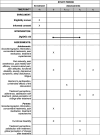Development, implementation and evaluation of a digital treatment for adolescents with chronic pain: a protocol for a multi-phase study
- PMID: 40534825
- PMCID: PMC12174134
- DOI: 10.3389/fdgth.2025.1555733
Development, implementation and evaluation of a digital treatment for adolescents with chronic pain: a protocol for a multi-phase study
Abstract
Chronic pain in adolescents is an increasing public health concern with a significant physical, psychological, and social impact. This study aims to develop, implement, and evaluate DigiDOL-Ad, a digital psychosocial treatment for adolescents with chronic pain, supplemented by dedicated websites for their parents and teachers. This multicenter study will be conducted in four phases: (1) Development of the intervention framework and foundational planning; (2) Focus groups with adolescents with chronic pain, their parents, teachers, healthcare professionals and health authorities to identify specific needs and tailor the psychosocial treatment and related components; (3) Iterative usability testing of the digital treatment, using an a hermeneutical circle methodology to refine the design based on participant feedback; and (4) Evaluation of DigiDOL-Ad through a pre-treatment, post-treatment, and 3-month follow-up assessment. DigiDOL-Ad has the potential to improve the quality of life for adolescents with chronic pain. By leveraging digital health technologies, this innovative approach could establish a new benchmark for treating adolescents with chronic pain, emphasizing interdisciplinary and stakeholder-driven care.
Clinical trial registration: clinicaltrials.gov, identifier NCT06765200.
Keywords: adolescents; chronic pain; digital health; digital therapeutics; mobile application; pain management.
© 2025 Miró, Sampietro, Monterde, Ingelmo, Wicksell, Nolla, Alonso, Lázaro, Martínez, Rubio, Sánchez, Sánchez, Vázquez, de la Vega and Reinoso-Barbero.
Conflict of interest statement
The authors declare that the research was conducted in the absence of any commercial or financial relationships that could be construed as a potential conflict of interest.
Figures
Similar articles
-
A Live Video Resiliency Dyadic Intervention for Persons With Dementia and Their Care-Partners Early After Diagnosis: Protocol for Open Pilot of Resilient Together for Dementia.JMIR Res Protoc. 2025 Jan 15;14:e60382. doi: 10.2196/60382. JMIR Res Protoc. 2025. PMID: 39814366 Free PMC article.
-
Engaging Older Adults With Cognitive Impairment in Digital Health Technologies: Protocol for a Scoping Review.JMIR Res Protoc. 2025 Jun 3;14:e65515. doi: 10.2196/65515. JMIR Res Protoc. 2025. PMID: 40460431 Free PMC article.
-
Implementing psychosocial interventions for teachers' mental health: Protocol for integrating scoping review with teachers lived experiences in LMICs.PLoS One. 2025 Jan 27;20(1):e0317351. doi: 10.1371/journal.pone.0317351. eCollection 2025. PLoS One. 2025. PMID: 39869609 Free PMC article.
-
Assessing the comparative effects of interventions in COPD: a tutorial on network meta-analysis for clinicians.Respir Res. 2024 Dec 21;25(1):438. doi: 10.1186/s12931-024-03056-x. Respir Res. 2024. PMID: 39709425 Free PMC article. Review.
-
Defining disease severity in atopic dermatitis and psoriasis for the application to biomarker research: an interdisciplinary perspective.Br J Dermatol. 2024 Jun 20;191(1):14-23. doi: 10.1093/bjd/ljae080. Br J Dermatol. 2024. PMID: 38419411 Free PMC article. Review.
References
Associated data
LinkOut - more resources
Full Text Sources
Medical




